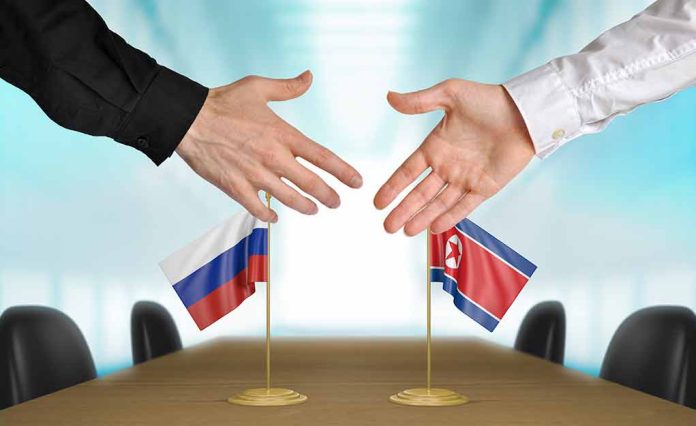
North Korea’s pledge to stand with Russia “until victory day” in Ukraine has sent shockwaves through the international community, raising concerns about the escalation of the conflict and its potential global implications.
At a Glance
- The US estimates 10,000 North Korean troops have been deployed to Russia.
- NATO calls this a “significant escalation” in the Ukraine war.
- North Korea’s involvement indicates Putin’s commitment to continuing the conflict.
- Concerns arise about potential military technology exchange between Russia and North Korea.
- The deployment could provide North Korea with valuable combat experience.
North Korea’s Controversial Deployment
In a move that has alarmed Western nations, North Korea has reportedly sent an estimated 10,000 troops to Russia, potentially marking a significant turning point in the ongoing Ukraine conflict. This development comes amid growing concerns about the deepening military cooperation between Pyongyang and Moscow, which NATO Secretary-General Mark Rutte has described as “a threat to both Indo-Pacific and Euro-Atlantic security.”
The Pentagon has expressed concern that these North Korean soldiers may be deployed for combat operations in the Kursk region, near the Ukrainian border. If confirmed, this would make North Korea the first government to officially send troops to support Russia in the Ukraine war, marking a significant escalation in the conflict.
Implications for Global Security
The involvement of North Korean troops in the Ukraine conflict raises serious concerns about the potential for further escalation and the wider implications for global security. This development comes in the wake of a mutual defense pact signed between Russia and North Korea in June, which has set the stage for increased military cooperation between the two nations.
The United States, South Korea, and Ukraine have also alleged that North Korea has been transferring arms to Russia, accusations that both Pyongyang and Moscow vehemently deny. These developments have led to growing apprehension among Western allies about the potential for a dangerous expansion of the war and its implications for regional stability.
Strategic Implications
The deployment of North Korean troops to Russia appears to be part of a broader strategy by President Vladimir Putin to bolster his forces without resorting to domestic mobilization. This approach aligns with Putin’s desire to avoid societal disruption within Russia while maintaining pressure on Ukraine and challenging Western support for Kyiv.
“Indeed, North Korea is now a full-fledged participant in the Ukraine war rather than merely supporting Russia by supplying artillery shells without any direct involvement in the conflict,” says Edward Howell, a lecturer in international relations at the University of Oxford.
For North Korea, this partnership offers an opportunity to refine its military doctrine, test weapons systems, and gain valuable experience in command, control, and electronic warfare. There are also concerns that this cooperation could aid North Korea’s nuclear weapons program development, further destabilizing the region.
International Response
The international community has responded with alarm to these developments. South Korea views the deployment of North Korean troops as a significant security threat, while U.S. and NATO officials have characterized it as a dangerous expansion of the war. Ukrainian President Volodymyr Zelensky has criticized the lack of response from allies regarding North Korean troop involvement and urged Western allies to remove restrictions on firing long-range missiles into Russia.
A new threat has emerged – the malign alliance between Russia and North Korea. I am grateful to the leaders and representatives of nations who refuse to turn a blind eye and speak openly about this dangerous collaboration aimed at increasing the scale of the war. About the supply… pic.twitter.com/3k70A8T7AF
— Volodymyr Zelenskyy / Володимир Зеленський (@ZelenskyyUa) October 20, 2024
As tensions continue to escalate, the international community faces the challenge of responding to this new phase of the conflict while preventing further destabilization of global security. The situation underscores the complex web of alliances and interests at play in the Ukraine war, with potentially far-reaching consequences for international relations and regional stability.














